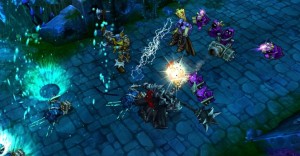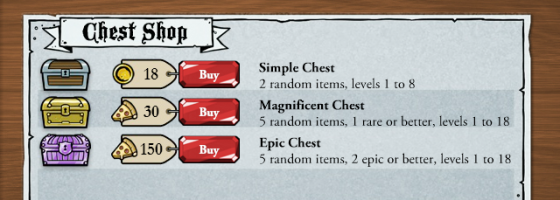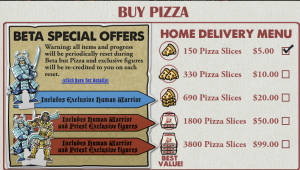Last week, podcast guest Chris Gardiner was curious about outside thoughts on micro transactions for his upcoming game: Below. He wanted to know if people prefer larger, but one time only transactions for content, or cheaper micro transactions that had to be purchased over and over again, or in other words, a “toll” transaction.
I and other people voted for the former and gave an explanation on the concept of ownership in video games and I wanted to share with you my thoughts on the matter.
Owing Up:
Over the last decade, the definition of ownership when it comes to games has been steadily declining. I may own over 400 Steam games, but I don’t really “own” them.
Instead, we’re given licenses that allow us to play games and as a majority, given up ownership in favor of accessibility and convenience. What that also means is that a second body has control over our games.
When you’re using a third party service like Steam or Origin, you’re effectively using a middle man to get to your games. Any problems with the service and your games go bye-bye.
There are rumors circulating that Microsoft will discontinue Games For Windows Live in July of next year. It’s hard to say what the impact will be, some say that it means that you won’t be able to play any GFWL required games, while other reports say that you can play the ones that you own, but you won’t be able to buy any new titles for your account.
Let’s not forgot about Origin and EA, who have repeatedly in the past discontinued online play from many of their games, effectively removing half the experience for owners. Or when Dark Spore owners could not authenticate with the single player service and the entire game was shut off for them.
And then there are free to play or social games where the game is entirely controlled by the designer or social media site and if either decides to pull the plug, then your game and all the money you spent are gone for good.
With ownership becoming more of a luxury than a right, it has become more valued these days than in the early days of the industry.
Without sounding hokey, there is a mystique about ownership for people. The fact that you can say that you really do own something: it’s your property and no one has say over it other than you, means a lot to people. That can be about cars, guns, homes or even video games.
Ownership and money used to go hand-in-hand — I give you money and in return, you give me ownership of a product to do with what I want (with exception to illegal activities.) But as we’re seeing with micro transactions in free-to-play games, that’s not necessarily the case.
When a social game offers shortcuts or micro transactions that have to be renewed, the user is not buying anything permanent. Instead they are buying something that lasts for a limited duration and then it is gone like it was never there.
The same can be said of games where real money can be used to buy in game money. While you are technically rich, in game terms, that money is not something that you own.
You can’t take your premium currency and cash out; instead it can only be used in that one specific game.
Premium currency for social games in that regard, reminds me of company tokens used during the railroad and mining days of the US. What happened was that companies instead of paying US currency to their workers, issued company tokens that could only be used at the company store for people to buy food and such. That meant the workers didn’t truly own their currency and it was all controlled and could be taken away by the company.
Bringing this back to micro transactions and my answer to Chris, whenever you want people to continue to spend money on your game, you have to walk a very thin line with what you have for sale.
Toll Bridge Games:
As we’ve talked about, ownership can be a powerful concept when it comes to convincing people to part with their cash. And I feel that micro transactions that offer no lasting value are frowned upon by traditional gamers and price conscious consumers.
Here’s a question for everyone: If a game was released with DLC at $10 a pop, but you also had the option to “rent” it. Renting it involved spending 25 cents and it would only last for 10 plays, after which you would have to spend money again to access it, what would you prefer?
Personally I prefer the former and I feel a lot of people are the same way. During the MMO era, I detested monthly fees as I never felt that I got my money’s worth. Since I didn’t play the games every day I was, in my opinion, throwing more money out than actually using it.
That feeds into the concept of ownership: When someone has control of not only their purchase, but their use on a product is a big deal. To spend money for a limited time deal as opposed to full ownership, you are sacrificing long term or permanent control, for short term value.

League of Legends profit structure is all about giving the player costumes and champions to own. That once purchased is theirs to keep.
In regards to the use of premium currency, if it can be used to purchase something permanent in-game, then it is nothing more than an analog for cash.
On the podcast with Joe Mcdonagh from Blue Manchu, we talked about the allure of buying costumes or skins in free-to-play games.
There is both a sense of ownership and personalization that goes into costumes, allowing someone to stand out from everyone else. Riot Games’ profit structure is based on buying skins. I’m really curious if Riot ever decided to offer a “rent” option for their costumes or champions, how many people would actually do it?
The difference between rent and ownership has also had a huge impact on buying video games and the change of the market. In the 90s when games were valued high, it made more sense to rent a $60 game for $10 to see if you would like it.
But today, thanks to sales and demos, why rent a game for $10, when you can eventually get it on sale for $15 or less? Renting content I feel is the same way: thanks to reviews and general impressions, you can get a good idea of whether something is worth it without the need to spend money renting.
Another topic for this piece on the subject of shortcut transactions: pay to skip levels, get more energy and so on. Obviously by now you can guess that I’m not a fan of these either. When you are spending money to bypass content, you’re not getting anything of real value in return. All you’re doing is setting yourself up for more micro transactions down the road.
When it comes to value, most social games don’t have much. When a game is designed around someone spending hundreds of dollars in micro transactions, I find that very devious. Especially, when the person is buying shortcuts and not even getting any form of ownership over the game. Now there is a debate over the value of time and whether it is alright to have micro transactions to cut down the time of doing something.
This is an interesting debate and depends on what we’re talking about. If a game has an item that requires a hundred hours to get or twenty five dollars, I find that in poor taste. When the design of a game is tuned to either have a huge time sink or money sink, the game just appears to be poorly designed.
Free-To-Play games have gotten a very bad opinion by gamers as colossal money sinks designed to take your money first and have gameplay second or third. Speaking with Joe and Chris on the cast, I’m rooting for them as it has to feel like an uphill battle to convince people on the merits of their games.
Sadly, the great free-to-play games are lumped in with the ones solely designed around getting as much money from the consumer as possible. And it is a case where a few rotten apples spoil the bunch. Hopefully games like Below and Card Hunter can succeed and help restore consumer confidence, as that will be a step in the right direction.




Pingback: The Early Access Debate | Game Wisdom()